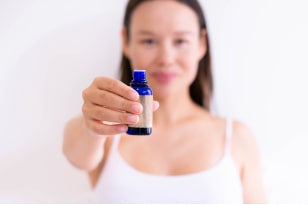
Compounded Bioidentical Hormones
Compounded bioidentical hormones are available in a wide variety of formulations and dosages, making customization and optimization for patients easy.
Bioidentical hormones are molecularly the same as our natural hormones. Synthetic hormones are not the same as our natural hormones. They are altered so they can be patented. Naturally occurring compounds cannot be patented.
Our natural hormones are perfectly designed for our bodies by Mother Nature. Synthetic hormones will never be as good or as safe as what Mother Nature has given us.
Pharmaceutical companies, and by extension our entire healthcare system, hate bioidentical hormones because they can’t profit from them, and because bioidentical hormones compete with products they sell, like SSRIs and osteoporosis medications.

Hot flashes and night sweats are common, can be disabling, and can go on for years or even decades. Bioidentical hormones are the best treatment by far.
Vaginal thinning, drying, and inflammation, and weakening of pelvic muscles occur with hormone loss. Symptoms include vaginal dryness, less pleasurable sex, and urinary incontinence. Bioidentical hormones are the most effective treatment.
Irregular periods and worsening PMS are often the first signs of perimenopause. Bioidentical hormones can help normalize the menstrual cycle.
Irritability, mood swings, brain fog, anxiety, and depression are all symptoms of hormone loss. Bioidential hormones treat the root cause, SSRIs don’t.
Hormone loss slows metabolism and increases midsection weight gain. Bioidentical hormones can increase metabolism and simplify weight loss.
Joint pain, muscle pain, fatigue, poor sleep, migraines, and heart palpitations are all possible symptoms of hormone loss. Bioidentical hormones treat the root cause, pharmaceutical drugs don’t.
Bioidentical hormones reduce the risk for osteoporosis, bone fractures, heart disease, and dementia when started within 10 years of menopause.

It is unfortunate, but our healthcare system has been shaped over a long time by influences that are motivated by profit over science.
The result is that our system prescribes pharmaceuticals for virtually everything, and overlooks natural remedies like bioidentical hormones, which can’t be patented, and compete with pharmaceuticals.
Follow the science. Restore and balance your hormones to treat the root cause of your menopause transition symptoms, to lower your risk for chronic disease, and to combat aging-related changes throughout the body.

Bioidentical hormone therapy is used to treat symptoms of perimenopause and menopause, and to improve quality of life and health.
The determination of whether you are a candidate for hormone therapy requires an assessment by an expert to evaluate your symptoms and risk.
Restoring and balancing your hormones can be life changing, but the benefits go far beyond this.
If hormone therapy is started within 10 years of menopause (before age 60), the health benefits include a lower risk for osteoporosis, bone fractures, heart disease, dementia, and a lower risk for mortality.

The top fear of doctors and patients about hormone replacement is that it increases the risk for breast cancer.
This is an old fear, dating from the early 2000s, that persists. Breast cancer risk was reported to be increased in the Woman’s Health Initiative (WHI) study published in 2002. This study used synthetic hormones, which function differently than bioidentical hormones.
Bioidentical hormones have never been shown to increase the risk of breast cancer. It makes sense. Why would something the body naturally makes, and is so important for life, cause breast cancer?

The importance of testosterone in women in under appreciated. Our bodies make more testosterone than estrogen, and testosterone levels decrease in perimenopause and menopause like estrogen and progesterone. Often testosterone deficiency occurs before estrogen and progesterone deficiency, in a woman’s 30s.
Symptoms of testosterone deficiency in women include low sex drive, difficulty achieving orgasm, low energy, fatigue, muscle loss, weight gain, and impaired mood.
Read more about testosterone therapy for women.


Compounded bioidentical hormones are available in a wide variety of formulations and dosages, making customization and optimization for patients easy.

FDA-approved bioidentical hormones are available in a limited number of formulations and dosages, making customization and optimization for patients more difficult.

FDA-approved synthetic hormones are available, but they are different than our natural hormones, and therefore function differently.
Bioidentical hormones are molecularly identical to the hormones our body’s naturally make. This means they function in exactly the same way as our natural hormones. Synthetic hormones (patented and sold by pharmaceutical companies) are molecularly different, and therefore function differently than our natural hormones.
Yes! Bioidentical hormones are molecularly the same as the hormones your body normally makes, and therefore function exactly the same as your normal hormones. Pharmaceutical companies make altered version of hormones (so they can patent them), but they don’t work in the same way as your body’s normal hormones. Mother Nature has provided us with the ideal hormones, and pharmaceutical companies, unsurprisingly, have not been able to improve upon them.
Yes, hormone therapy can improve quality of life and provide anti-aging benefits when started at an older age, but the maximal medical benefits (prolong life, decrease risk for heart disease, osteoporosis, and dementia) occur when hormone replacement is started within 10 years of menopause. A qualified clinician can assess your specific situation to help you determine if hormone therapy would be appropriate.
Studies have never shown that bioidentical hormones increase the risk of breast cancer. It makes sense. Why would a hormone the body normally makes cause breast cancer? Medroxyprogesterone acetate, a synthetic progesterone, on the other hand, does slightly increase the risk for breast cancer, and is the reason for why hormone replacement fell out of favor in the early 2000s. Pharmaceutical companies can’t patent naturally occurring hormones, so their approach is to alter natural hormones so they can patent and “own” them. The risk with medroxyprogesterone acetate is for about 1 in 1000 women to get breast cancer who wouldn’t otherwise get it.
Often benefits will be felt within the first week, but it can take several weeks to months to feel the full effect of hormone therapy.
If HRT is started within 10 years of menopause, the benefits far outweigh the risks in most women. Benefits include a lower risk of all-cause mortality, heart disease, osteoporosis, and dementia. If HRT is started more than 10 years after menopause, the risk reward ratio is not as clearcut. Oral estrogen (which we don’t use) does increase the risk for blood clots, and synthetic progesterone (which we don’t use) does increase the risk for breast cancer.
Our healthcare system focuses on the diagnosis and treatment of disease using pharmaceuticals. Perimenopause and menopause aren’t diseases, and the best treatments aren’t pharmaceuticals. 80% of gynecologists say they are untrained in menopause. Furthermore, many doctors wrongly believe that the risks of HRT outweigh the benefits because of old studies utilizing synthetic hormones, not bioidentical hormones. The fact is, if bioidentical hormone therapy is begun within 10 years of menopause, the benefits far outweigh the risks in most women, including a decrease in mortality, heart disease, osteoporosis, and dementia.
Yes, we accept blood tests done within 6 months of evaluation and treatment. Lab work previously obtained is not required for your initial consultation but may be helpful if it was conducted in the past 3-6 months. Labs may be requested prior to initiating hormone replacement therapy and are routinely obtained as part of ongoing monitoring and follow-up.

The first step is a free consult with a board-certified hormone and wellness expert in our Brea office to learn about hormone therapy and whether it is right for you.